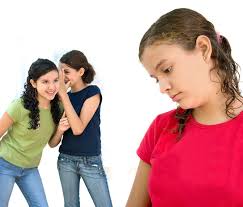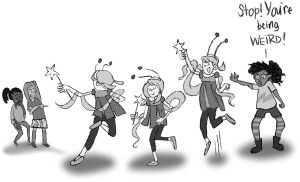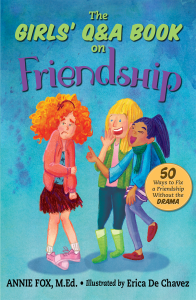|
|
October 5, 2015
 “I hate you!” “I hate you more!!!” My two older brothers constantly picked fights with each other. I’m talking about shouting, punching, wrestling and chair throwing. While I wasn’t engaged in any of the physical stuff, one of my brothers took special delight in teasing me to the point of tears. My mom did a lot of totally ineffective yelling. Thankfully, the three of us get along very well now, but, man, it didn’t have to be the way it was back then.
I swore, as a parent, I’d do my best to raise my children in a way that gave us peace in the house. We all want that, right? We want our kids to get along with each other so that this life-long connection of theirs will be a loving and supportive one. We want them to grow up looking forward to visiting each other on holidays, with their own kids in tow, and really enjoy being together. Right? Of course!
So how do you get there if you’re currently entrenched in sibling wars?
Start by taking a good hard look at the way you respond to your kids’ conflicts with each other. Your response can make a whole lot of difference when it comes to turning this ship around. Sometimes our kids fight and bicker and argue so frequently that we become desensitized to the noise and tension and just tune them out. You may only wake up when someone outside the immediate family notices the decibel level and comments, “Wow, it’s kinda loud in here. What’s going on with your kids?” To which you may respond, “Oh, they’re always like this.”
When you, as a parent, turns a blind eye to sibling conflict, the message you’re sending to your kids (especially to the current aggressor) is: “What you’re doing is OK with me.” But it’s not OK. Don’t accept the unacceptable. What you put up with you promote. Time for a change.
Tips to help you make a more peaceful home:
1. Tune in to the your kids’ conflicts. Disagreements are normal and beneficial in the social and emotional development of children. They need lots of practice negotiating, compromising, and problem-solving. But when hostilities between siblings heat up to the point of aggression (verbal and/or physical) your parental leadership is needed… now.
2. Stay calm. To teach kids to be respectful with each other, you need to respond to their conflicts calmly, maturely and respectfully. If you can’t do that in the moment (because your kids’ fighting has pushed your buttons way too many times), take a break… take some slow deep breaths… and then start to talk to your children about what’s going on.
3. Talk to them separately. Give each child a chance to talk to you very openly and honestly about what is at the bottom of their constant hostility. After each has told you their “side”, bring them together while you help them figure out a way respectful way through their conflict. Keep doing this and after a while your kids will do this on their own.
4. It’s your job. If you don’t teach them to deal with their emotions in productive ways so they don’t hurt each other, they won’t learn it. Ultimately your leadership will determine how your kids will resolve conflicts with each other, with peers and, later in life, with romantic partners.
If you could use some professional support, please avail yourself of parent coaching. There are many many great parent coaches who often specialize in helping parents resolve sibling conflicts. You might ask your pediatrician or your child’s school counselor for a referral.
I hope this helps.
In friendship,
Annie

June 6, 2015
For the next few months my blog will focus on answering your parenting questions about raising tweens and teens as well as letting you in on some of the letters I get from tweens and teens. So if you’ve got something on your mind that you could use help with, send it to AskAnnie. (Of course it will be posted without any names, so no worries there.)
Today’s question: How do I keep my 11 yr old away from a bad friend?
 And you still think she’s your friend?! First you’ve got to realize that your definition of a “bad” friend might not be the same as your child’s. In fact, if your child has a history with this friend and is very attached, trying to pry her away will most likely land you smack in the middle of an ugly, pointless power struggle in which you will become the bad guy.
The most effective way to handle something like this is to help your child develop standards for what constitutes a good friend vs. the other kind. You can do it by making observations about what you see. For example, you might say, in a neutral voice, “You know, honey, I’ve noticed, when you come home from Jack’s house you’re usually in a bad mood. Sometimes you take it out on your sister. Sometimes you’re rude to me. I’m wondering what’s going on here?” Right then and there, you create a safe environment for your child to think about what you’ve observed and to let you in on where this chronic “bad mood after being with Jack” might be coming from.
Another approach is to share what you see when the two kids are together. You might say something like this, “I notice when Jack comes over, he seems to be bossing you around. Sometimes I hear bad language and I’m not happy with that. It seems like you two spend more time fighting than getting along. What’s up with that?” After an observational statement like this, simply close your mouth and listen to what your son or daughter has to say.
These techniques let you inside the mind of your child more effectively than provocative statements. (“You don’t actually like that awful boy, do you?!!”) Loaded questions like that don’t go over well with tweens and teens.
If you have good reasons, you are also perfectly within your rights to say, “Your friend is no longer welcome in our home and here’s why…” That conversation can be an eye-opener for your child and provide lots of food for thought.
Bottom line, the best way to influence tweens and teens in the direction of more positive friendships is to make neutral observations so the conversation can open up rather than shut down. That’s how to infuse your child with essential information about what it means to be a real friend.
I hope this helps. And until next time, happy parenting.

March 17, 2015
Morning walks with The Pupster reveal more and more free stuff in the neighborhood. Curbside boxes filled with coffee mugs (“Kalua!”), anemic Christmas cacti, Danielle Steele novels, rusty tools. (Be still, my heart!) Horray for spring cleaning. I should race down to my own garage and thin out the flotsam and junksam, but I’d rather be blogging.
 My best friend doesn’t love me anymore! Though yesterday, I did a bit of feng shui. In my SENT BOX, I found a dust-covered Hey Terra letter from 2002. (Thank god, I answered it promptly, thirteen years ago.) I have no idea why I hung on to this one. I’ll take it as a sign it should be posted, if for no other reason than to give me permission to delete it and to show that when it comes to girls’ friendship issues, some things don’t change.
Hey Terra,
My best friend of five years has just decided to end our friendship.
She claims that I constantly destroy her self-esteem. I always try to support her, and tell her how wonderful she is. I am usually there to pick up the pieces after she is hurt by others. So I don’t understand why she’d accuse me of things I have never done. She also claims that we don’t get along anymore. This is the first spat we’ve had in five years. She never allowed the friendship to push through the disillusionment/spat to actually cultivate a more meaningful relationship. She just ended it.
She seems to lean towards friendships that really have no depth.
She always has to be the leader of the group. Another thing, she
never has any passion for anything in her life (except her own
wants). She cannot see past herself. She tends to separate
herself from people who actually have passion in their life.
She never listens either. I just do not understand why she would be
like this, and why she refuses to listen to anyone. Doesn’t a close,
five-year relationship mean anything to her? She wasn’t even
willing to try to work at it!
Thanks,
Curious
Dear Curious,
From what you describe it sounds like you and your friend expect very
different things from a friendship. You seem to be looking for a
“meaningful” relationship that goes beyond the surface. You think of
yourself as someone who has passion for things and you clearly
don’t admire the fact that she “never has any passion for anything…
except her own wants.” You describe your friend as a person who needs
to be in control and tends to be self-centered and “never listens to
anyone.” From your words, she doesn’t sound like much fun to be around.
Yet, in spite of all these differences, which have clearly been obvious to you for a while, you still call this a “close” relationship. That makes me “Curious” too! Is
this a real friendship or a 5-year habit that you might be interested in breaking?
Think about it.
In friendship,
Terra
Meanwhile, back in 2015…. How might we do a better job teaching our girls there are standards in friendships and that it’s smart to evaluate relationships with an eye toward what you want and need? If it turns out that your daughter is not happy in a friendship, encourage her to discuss it (privately and respectfully) with her friend. If that doesn’t result in positive changes, let’s teach our girls to find the EXIT so they can get more of what they deserve from someone else. Your thoughts?

March 6, 2015
When girls email me about the mean things their so-called friends say and do, it’s often about rocking the boat. You know, Friend A is expressing her individuality and Friend B is, well, uncomfortable. After a bit she can’t stand it and jumps all over Friend A to CUT IT OUT!
Here’s an excerpt from The Girls’ Q&A Book on Friendship that illustrates the problem and the solution for any girl who is tired of playing by someone else’s rules.
Q: “When my friend does weird things I don’t say anything. But when I do something (like a funny dance) she yells at me. I want to tell her I don’t like that, but I don’t want to be mean, like her.”
 Illustration © Erica De Chavez, 2014 from The Girls’ Q&A Book on Friendship, written by Annie Fox A: I think it’s awesome that you accept your friend for who she is and do not put her down when she does any of her “weird” things. You deserve the same respect from her. She shouldn’t yell at you when you dance, especially since you’re not trying to hurt or embarrass her. You’re just feeling free and joyful, and that’s good.
I don’t know for certain, but maybe your friend gets upset because she’s worried that other girls will tease you about your dancing. Or maybe she’s scared that someone will tease her for being your friend! When we are scared or worried, we aren’t always as kind as we should be. But that’s never an excuse for being rude.
When you feel like dancing, go ahead and dance. If your friend has a problem with that, then talk to her about it. Maybe you can help her lighten up. But whatever you do, please, do not stop being yourself. It’s absolutely the best thing about you.
_________
Check out other 49 Questions in The Girls’ Q&A Book on Friendship: 50 Ways to Fix a Friendship Without the DRAMA.
 50 Ways to Fix a Friendship without the DRAMA

| |
















